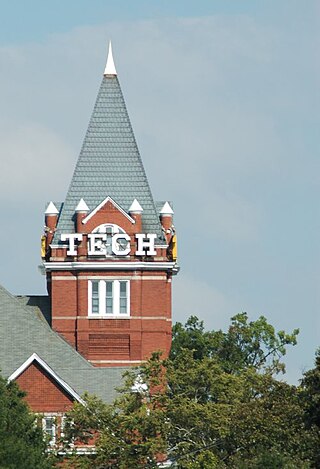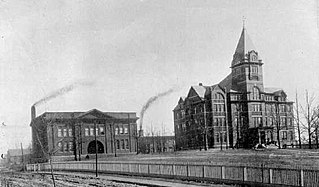
The Technique, also known as the "'Nique", is the official student newspaper of the Georgia Institute of Technology in Atlanta, Georgia, and has referred to itself as "the South's liveliest college newspaper" since 1945. As of the fall semester of 2011, the Technique has a weekly circulation of 10,000, distributed to numerous locations on the Georgia Tech campus and a handful of locations in the surrounding area. The first issue of the Technique was published on November 17, 1911, and the paper has printed continuously since its founding. The paper publishes weekly throughout the regular school year and primarily covers news, events and issues specific to the Georgia Tech community. In 2004 it was one of 25 collegiate newspapers to receive the Pacemaker award from the Associated Collegiate Press.

Lyman Hall was a professor and president of the Georgia School of Technology. Hall's administration introduced degrees in electrical engineering and civil engineering in December 1896, textile engineering in February 1899, and engineering chemistry in January 1901.

Blake Ragsdale Van Leer was an engineer and university professor who served as the fifth president of Georgia Institute of Technology from 1944 until his death in 1956.

The Scheller College of Business is the business school at the Georgia Institute of Technology, a public research university in Atlanta, Georgia. It was established in 1912 and is consistently ranked in the top 30 business programs in the nation.

The College of Computing is a college of the Georgia Institute of Technology, a public research university in Atlanta, Georgia. It is divided into four schools: the School of Computer Science, the School of Interactive Computing, the School of Computational Science & Engineering, and the School of Cybersecurity and Privacy. The College of Computing's programs are consistently ranked among the top 10 computing programs in the nation. In 2022, U.S. News & World Report ranked the Computer Science graduate program #6 in the U.S. In 2016, Times Higher Education and the Wall Street Journal ranked the College #5 in the world.

Isaac Stiles Hopkins was a professor and the first President of the Georgia Institute of Technology (1888–1896) as well as pastor of the First Methodist Church in Atlanta, Georgia.

The Lettie Pate Whitehead Evans Administration Building, commonly known as Tech Tower, is a historic building and focal point of the central campus of the Georgia Institute of Technology in Atlanta, Georgia, United States.

The history of the Georgia Institute of Technology can be traced back to Reconstruction-era plans to develop the industrial base of the Southern United States. Founded on October 13, 1885, in Atlanta as the Georgia School of Technology, the university opened in 1888 after the construction of Tech Tower and a shop building and only offered one degree in mechanical engineering. By 1901, degrees in electrical, civil, textile, and chemical engineering were also offered. In 1948, the name was changed to the Georgia Institute of Technology to reflect its evolution from an engineering school to a full technical institute and research university.

The Information School is the information school of the University of Washington, a public research university in Seattle, Washington. Formerly the Graduate School of Library and Information Sciences since 1984, the Information School changed its focus and name in 2001.

The Georgia Tech Library is an academic library that serves the needs of students, faculty, and staff at the Georgia Institute of Technology. The library consists of the S. Price Gilbert Memorial Library and Dorothy M. Crosland Tower. In addition, the library is connected to and manages the Clough Undergraduate Learning Commons.

Virginia Lacy Jones was an American librarian who throughout her 50-year career in the field pushed for the integration of public and academic libraries. She was one of the first African Americans to earn a PhD in Library Science and became dean of Atlanta University's School of Library Sciences.

The Georgia Institute of Technology is a public research university and institute of technology in Atlanta, Georgia. Established in 1885, it is part of the University System of Georgia and has satellite campuses in Savannah, Georgia, Metz, France, Shenzhen, China, and Singapore.

Lawrence Wood "Chip" Robert Jr. (1889–1976) was a 1908 graduate of the Georgia Institute of Technology and founder of noted Atlanta engineering and architectural firm, Robert and Company. He served as Assistant Secretary of the Treasury in the early years of the New Deal.
James "Jim" Edward Dull was dean of students of Georgia Institute of Technology from 1964 to 1991. Dull was instrumental in the peaceful integration of Georgia Tech, and he oversaw many improvements with student life during his tenure at Georgia Tech.

The main campus of the Georgia Institute of Technology occupies part of Midtown Atlanta, primarily bordered by 10th Street to the north, North Avenue to the south, and, with the exception of Tech Square, the Downtown Connector to the East, placing it well in sight of the Atlanta skyline. In 1996, the campus was the site of the athletes' village and a venue for a number of athletic events for the 1996 Summer Olympics. The construction of the Olympic Village, along with subsequent gentrification of the surrounding areas, significantly changed the campus.
The Southeastern Library Association (SELA) is an organization that collaborates with different library associations within the Southeastern United States, including Alabama, Arkansas, Florida, Georgia, Kentucky, Louisiana, Mississippi, North Carolina, South Carolina, Tennessee, Virginia, and West Virginia.
Rhoda Garoogian (1933–1998) was an American author and librarian who served as the Assistant Dean of the Pratt Institute School of Information and Library Science beginning in 1977, and Acting Dean from 1989 to 1991. Much of her scholarship was in the field of education for librarians and practices of library use, and she also co-authored a series of city ranking guides with her husband, Andrew Garoogian.

Annie Lou McPheeters was an African American librarian and civil rights activist. She was known for starting the Negro History Collection at the Auburn Carnegie Library, in Atlanta Georgia. The Atlanta-Fulton Public Library System named the Washington Park/Annie L. McPheeters Branch Library in honor of her work.

Mary Allan Ronnie was a New Zealand librarian. She was New Zealand's first female National Librarian, from 1976 to 1981, and the first woman in the world to head a national library. Before becoming National Librarian she was head of Dunedin Public Library, and afterwards she served as Auckland City Librarian.
Lorene Byron Brown was an African American librarian and Dean of the Atlanta University School of Library and Information Science from 1982 to 1989.
















